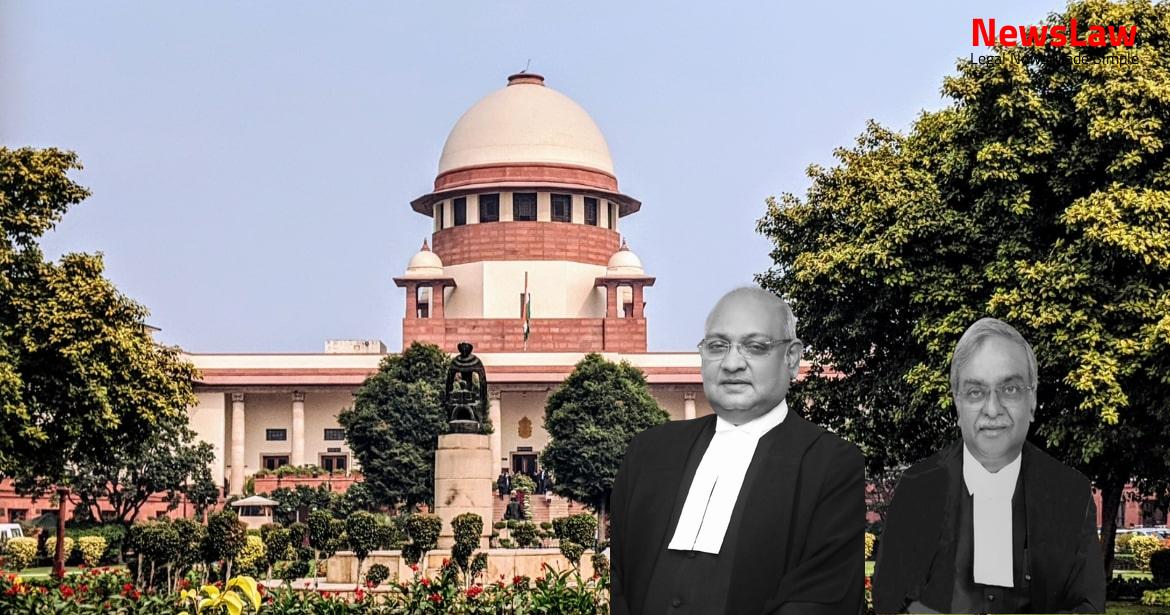Dive into the insightful legal analysis of a recent court case revolving around a land transaction dispute and caste entitlements. The case explores the nuances of residency claims, caste recognition, and adherence to state laws governing land transactions. Discover how the court navigates the intersection of land rights and social justice, shedding light on the complexities of caste entitlements in different states.
Facts
- The land in question was in possession of Puran Singh, who was not a Scheduled Caste person, leading to the sale deed being in violation of Section 13 of the Rajasthan Colonization Act, 1954 and Section 42 of the Rajasthan Tenancy Act, 1955.
- The respondent, the original plaintiff, received possession of the land as per the decree of the trial Court.
- The land was initially allotted to Chunilal, a Scheduled Caste landless person and the father of the respondent, but a fraudulent sale deed was executed transferring ownership to the appellant, the original defendant.
- The respondent filed a suit for ejectment against Puran Singh and the appellant, claiming the sale deed was void and violated relevant Acts.
- The High Court Division Bench allowed the respondent’s Appeal, setting aside the judgment of the Single Judge, stating that the appellant, being a Scheduled Caste resident of Punjab, could not benefit from the same status in Rajasthan.
- FAC (Finding/Acceptance/Conclusions) of the judgement stated that the possession was with Puran Singh and not Bhadar Ram.
- The original defendant, appellant, filed an appeal before the Board of Revenue.
- The appeal was allowed on 25.04.1989, granting compounding benefit to the original defendant upon payment of compounding fees under Section 13 of the Rajasthan Colonization Act, 1954.
Also Read: Ruling on Circumstantial Evidence in Murder Case
Issue
- The issue at hand is whether the land transaction in favor of the appellant – original defendant was illegal and in violation of Section 42 of the Rajasthan Tenancy Act, 1955 and Section 13 of the Rajasthan Colonization Act, 1954.
- The appellant involved in the case belongs to the Scheduled Caste of the State of Punjab.
- The key question is whether the land transaction was carried out in a manner that contravenes the relevant laws of Rajasthan.
- The location of the land in question is confirmed to be within the State of Rajasthan.
Also Read: Challenging Legal Presumptions in Negotiable Instrument Cases
Arguments
- Argument presented by the petitioner’s counsel regarding the need for further inquiry into residential status before determination.
- Citing the report of the Action Committee on caste certificates for Scheduled Castes and Scheduled Tribes in Maharashtra.
- Discussion on the judgment of Action Committee regarding the status of a migrant returning to his State of origin and the issue of Scheduled Caste status.
- Reference to Section 20(1) of the Representation of People Act, 1950 in support of the petitioner.
- Assertion that the consideration received for the land was retained by the respondent, while the petitioner continued to pay compounding fees.
- Admission by the respondent that the petitioner is a member of the Scheduled Caste.
- Claim that due to the absence of proper issues framed regarding the petitioner’s status, adequate evidence could not be presented.
- Argument that the purchase of property does not inherently require state reservation and should be seen as a transaction regulated by law.
- Explanation of Section 13A of the Rajasthan Colonization Act, 1954 permitting compounding and regularization of transactions.
- Shift in focus by the respondent to Section 42 of the Rajasthan Tenancy Act, 1955 after the Board of Revenue’s decision.
- Counsel’s assertion that mere residence or ownership of a house in Punjab does not make the petitioner an ordinary resident of Punjab.
- Reference to constitutional judgments in support of the petitioner’s claim for Scheduled Caste benefits in Rajasthan.
- Opposition to the respondent questioning a sale after 5 years as a sign of bad faith and abuse of legal process.
- The appellant – original defendant, a resident of Punjab and a member of Scheduled Caste in Punjab, cannot claim benefits of Scheduled Caste in Rajasthan, as per the High Court’s decision.
- The transaction between the respondent-plaintiff and the appellant-original defendant is considered to be in violation of Section 42 of the Rajasthan Tenancy Act, 1955.
- The appellant-original defendant’s claim of being a resident of Rajasthan based on his grandfather’s land ownership in Rajasthan is deemed insufficient, as mere land ownership does not establish residency.
- The land purchased by Puran Singh in the name of Bhadar Ram, allegedly a benami transaction, was found to be in possession of Puran Singh, thereby violating Section 13 of the Rajasthan Colonization Act, 1954.
- The permission for compounding under Section 13A was improperly given by the Board of Revenue to the appellant-original defendant, beyond the permissible time limit, and without the transferee being in possession.
Also Read: Legal Analysis Critique in High Court’s Quashing Order
Analysis
- The case involves a dispute over a land sale transaction in Rajasthan involving a Scheduled Caste individual from Punjab.
- The respondent argues that the sale violated certain provisions of the Rajasthan Colonization Act and the Rajasthan Tenancy Act.
- The court references previous rulings regarding Scheduled Caste individuals migrating between states and their entitlements.
- It emphasizes the need for balance in protecting disadvantaged communities while ensuring equal opportunities for all.
- The discussion also touches upon the social adjustments required to ensure equality and protection for all communities.
- The appellant’s residency status in Rajasthan is challenged based on documentation and migration history.
- The court highlights the complexity of determining entitlements based on caste specifications in different states.
- Dr. Ambedkar’s perspective on privileges for Scheduled Tribes in tribal areas versus other parts of India is referenced.
- The ruling reaffirms that tribal area privileges do not automatically extend to other regions.
- The appellant argues that being a Scheduled Caste individual exempts the land sale from breaching the Rajasthan Tenancy Act.
- Allegations of fraudulent sale deed signature and financial transactions are raised in the case.
- The court dismisses the appellant’s argument that previous decisions were not applicable to the property sale dispute.
- – Section 42 of the Rajasthan Tenancy Act, 1955 restricts sale, gift, or bequest by a member of the Scheduled Caste to a person who is not a member of the Scheduled Caste.
- – The provision aims to preserve the rights and privileges of Scheduled Castes.
- – The President’s power under Articles 341 and 342 of the Constitution is limited to specifying Scheduled Castes or Scheduled Tribes for a particular State or Union Territory.
- – Once a notification is issued under these articles, Parliament can only make limited changes to the list of Scheduled Castes or Tribes specified in the notification.
- – The specificity in specifying castes or tribes is to be noted, particularly in relation to a particular State or Union Territory.
- In the given case, the appellant, originally from Punjab and belonging to a Scheduled Caste, cannot claim the benefit of a Scheduled Caste in Rajasthan for purchasing land from a Scheduled Caste person in Rajasthan.
- The sale transaction in favor of the appellant was deemed to be a breach of Section 42 of the Rajasthan Tenancy Act, 1955 and Section 13 of the Rajasthan Colonization Act, 1954.
- The High Court upheld the decision rejecting the claim based on the appellant’s caste status.
- The State of Uttarakhand denied benefits to a petitioner claiming Scheduled Tribe status for medical college admission.
- The Constitution Bench judgments in Marri Chandra Shekar Rao and Action Committee were cited, emphasizing that caste recognition in the migrant state does not automatically grant the migrant the same status as in the state of origin.
- Benefit of compounding under Section 13A(2) cannot be granted when an order of ejection has already been passed and possession handed over.
- Section 13A(2) of the Rajasthan Colonization Act, 1954 is applicable only when the person has not been ejected despite the order.
- The order of compounding in this case was contrary to Section 13A(2) of the Act.
- The land transaction was in breach of Section 13 of the Rajasthan Colonization Act, 1954 and Section 42 of the Rajasthan Tenancy Act, 1955.
- The Division Bench of the High Court correctly held the land transaction to be void.
Decision
- The appellant approached the High Court after the initial judgement.
- Given the circumstances, the current appeal has failed and is dismissed.
- The appeal has been accordingly dismissed by the court.
Case Title: BHADAR RAM (D) THR. LRS. Vs. JASSA RAM . (2022 INSC 15)
Case Number: C.A. No.-005933-005933 / 2021



